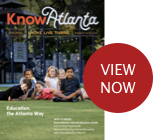School Designations and Classifications
Charter: A charter school is an independently run school that is still funded through taxes. These public schools are free to operate outside of several regulations that apply to regular public schools, and are held to academic standards defined by each school’s individual charter.
More info: State Charter Schools Commission scsc.georgia.gov
Montessori: Montessori schools take a different approach to learning for children allowing them the freedom of personal exploration in a mixed-age setting. Developed by Italian physician Dr. Maria Montessori, these schools focus on child development through the child’s individual choices and encourage independence in students.
More info: American Montessori Society amshq.org
Alternative Education Program: A state program designed to give local school districts flexibility for students who have difficulty in a traditional classroom. The program works in various areas including in-school suspension, a school/community guidance center and a community-based alternative education program.
More info: Georgia Department of Education gadoe.org > School Improvement > School and District Effectiveness > Alternative Education Program and Magnet Schools
Magnet: A public school for students with special interests and abilities beyond a traditional public school with the intent of expanding school diversity. They offer students a distinctive curriculum, often specializing in math, science and technology or visual and performing arts.
More info: Georgia Department of Education gadoe.org > School Improvement > School and District Effectiveness > Alternative Education Program and Magnet Schools
Independent Schools and Private Schools: Though the terms are often used interchangeably, they do not mean the same thing, and schools can fall into either or both categories. A private school refers to any learning institution that does not receive public funding from its state government. Independent schools are private schools that are overseen by a board of governors or trustees. While both are non-public, the boards that oversee independent schools are truly independent of any other organization, whereas a private school can be governed by any outside entity, from nonprofit organizations to churches to for-profit corporations.
More info: Georgia Independent Schools Association gisa.org
Special Needs: A school designed for those with learning or developmental difficulties. These schools employ unique educators and methods to reach students with different abilities and needs. The Georgia Special Needs Scholarship Program is a school choice program available for special needs students attending Georgia public schools who are served under an Individualized Education Plan (IEP).
More info: Georgia Department of Education gadoe.org > External Affairs and Policy > Policy > Special Needs Scholarship Program
Georgia Virtual School: This program of the Georgia Department of Education’s Curriculum and Instruction Division is SACS CASI accredited and operates in partnership with schools and parents to offer more than 100 middle school and high school level courses across the state. The online school provides a teacher-led, virtual classroom environment with course offerings in core content areas, world languages, CTAE, electives, and a vast AP course selection.
More info: Georgia Virtual School gavirtualschool.org
Blue Ribbon School: These schools’ enrollments must include at least 40 percent of their students from disadvantaged backgrounds. Additionally, these public schools must meet their state’s annual objectives in each of the two years prior to a nomination for this designation, then again the year in which a school is nominated.
Georgia School of Excellence: An annual recognition from the Georgia Department of Education of one public school in each district ranked in the top 10 percent of state schools. These schools must meet AYP for three years in a row, offer AP courses and show gains in student achievement.
Specialized Programs
IB (International Baccalaureate): International Baccalaureate strives to help students develop multiple skills including intellectual, personal and social to live and work in a globalizing world. It is similar to an AP curriculum, but differs in the type of credit and testing issued at the completion of the program.
AP (Advanced Placement): The Advanced Placement program provides students the opportunity to take college-level courses through a certified instructor in their own school. Students may earn college credit for the courses based on their scores on the AP Exams at the end of the semester.
Accelerated and Gifted Education: Gifted education offers motivated and high-achieving students opportunities to challenge themselves beyond a traditional classroom setting. The activities offered differ from district to district, but the programs aim to foster creativity and communication skills.
Move on When Ready: A program that allows students to complete high school on a college campus, while earning college credits.
Hope Scholarship (Helping Outstanding Pupils Educationaly): This scholarship program provides financial aid to high performing Georgia students to attend public and private colleges within the state. This scholarship is funded by the Georgia Lottery.
School Accreditation Organizations
AAAIS: The Atlanta Area Association of Independent Schools aais.org
ACSI: The Association of Christian Schools International acsi.org
GAC: Georgia Accrediting Commision coe.uga.edu/gac
GAPSAC: The Georgia Private School Accreditation Council gapsac.org
GISA: The Georgia Independent School Association gisa-schools.org
JATP: The Joint Admissions Testing Program jatp.org
NAIS: The National Associationof Independent Schools nais.org
SACS/CASI: The Southern Association of Colleges and Schools now part of AdvancED. advanc-ed.org
SAIS: The Southern Association of Independent Schools sais.org
Standardized Tests
ACT: Entrance exam testing English, Mathematics, Reading, Science and optional writing for college admission.
PSAT: A Preparatory SAT examination that also serves as a qualifier for students to be recognized as national merit scholars.
SAT: College entry exam that tests students’ knowledge in reading comprehension, grammar and math.
SSAT: (Secondary School Admissions Test): An assessment for students grades 3 to 11 used by many independent schools in their admissions process.
NAEP: (National Assessment of Educational Progress): National testing for students in grades four and eight to calculate the success of the state’s educational programs.
GMAS: (Georgia Milestone Assessment System): State testing for students in grades 3 through high school to measure achievement in the core subjects of English, science, math and social studies.
GKIDS: (The Georgia Kindergarten Inventory of Developing Skills): A performance-based assessment designed to provide teachers with information about the needs of students in kindergarten and first grade.
Georgia Accreditation
AYP (Adequate Yearly Progress): A system of measuring student progress and achievement through statewide testing mandated by the No Child Left Behind Act.
CCRPI (College and Career Ready Performance Index): The Georgia Department of Education’s accountability system. Public schools are graded on a 100-point scale in there major areas: achievement, progress and the achievement gap.
GSAPS (Georgia School Assessment on Performance Standards): This evaluation process for public schools analyzes a school’s understanding and ability through classroom observations, surveys and focus groups and provides recommendations and ratings for improvement.









